中考英语语法总复习课件(共45张PPT)
图片预览
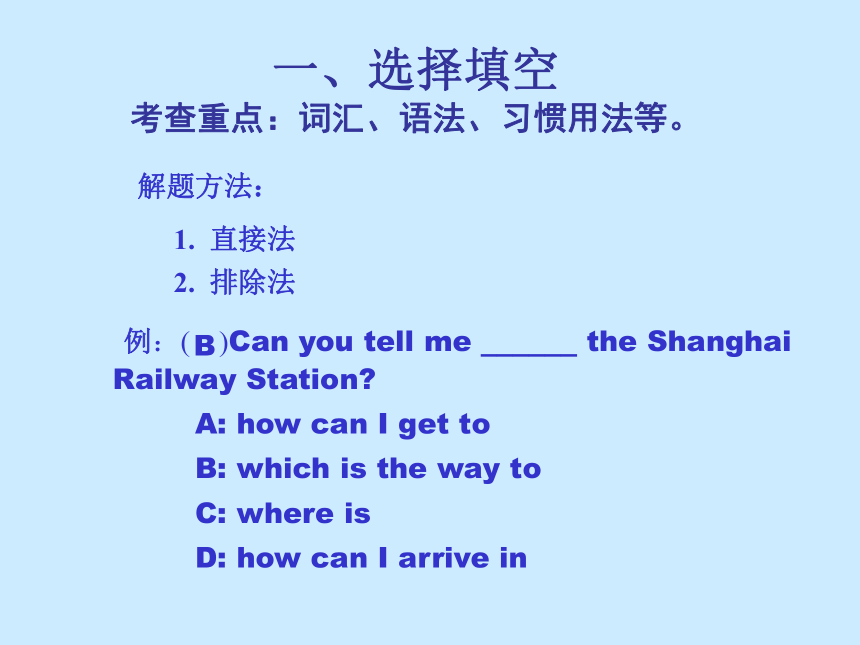
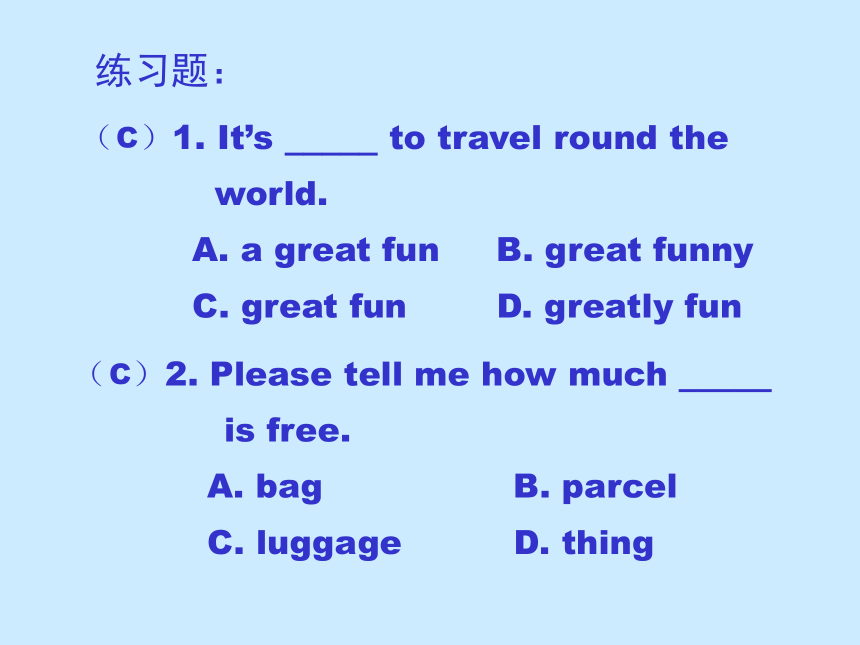
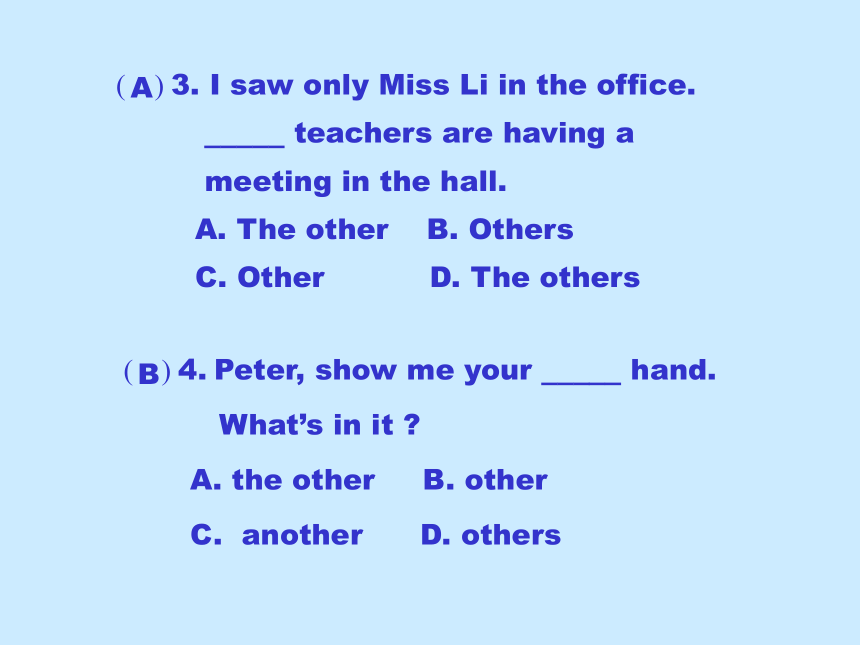
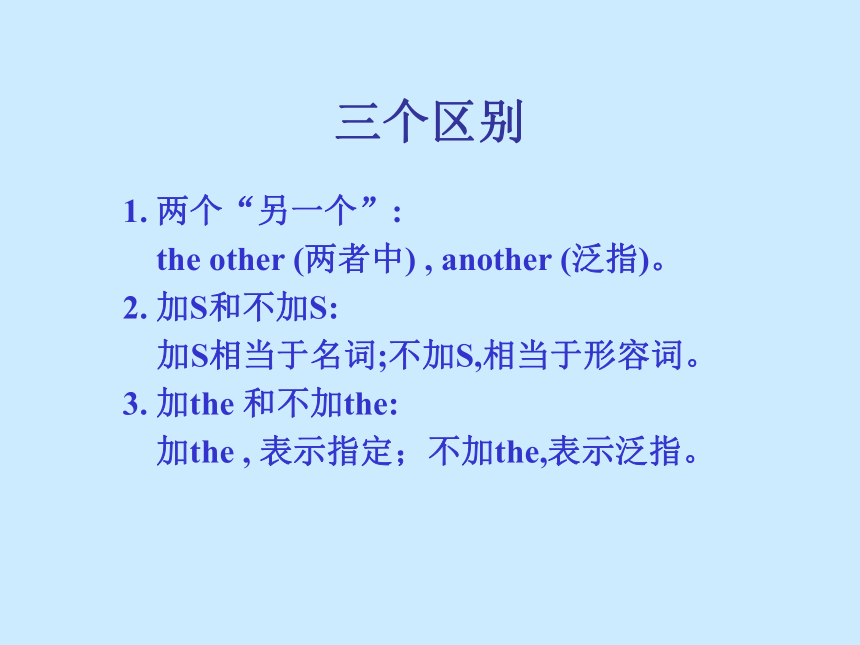
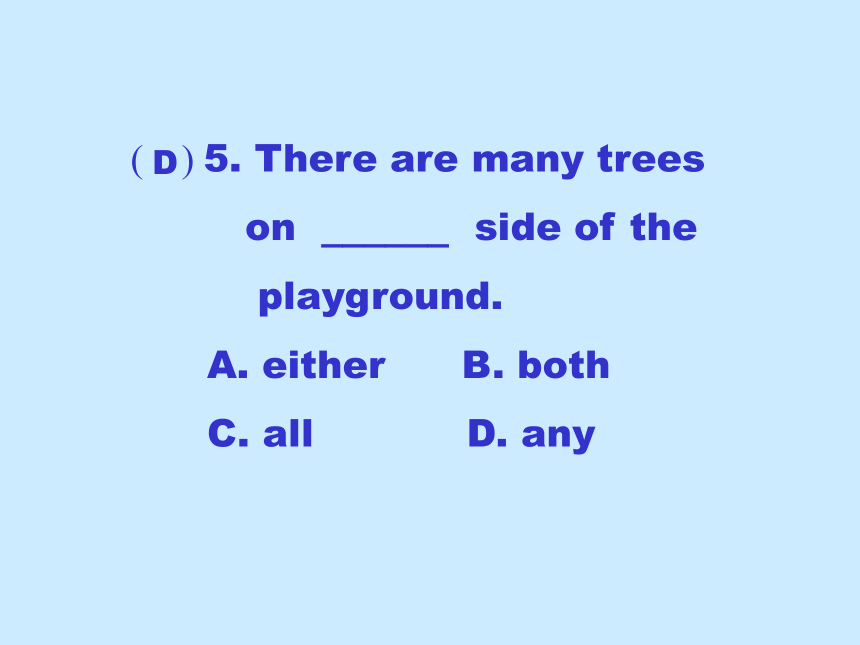
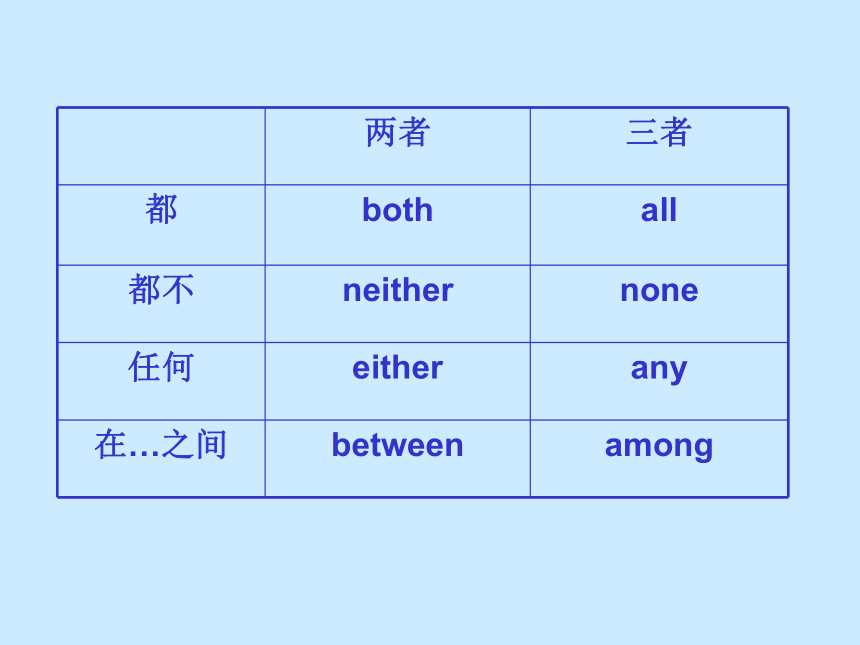
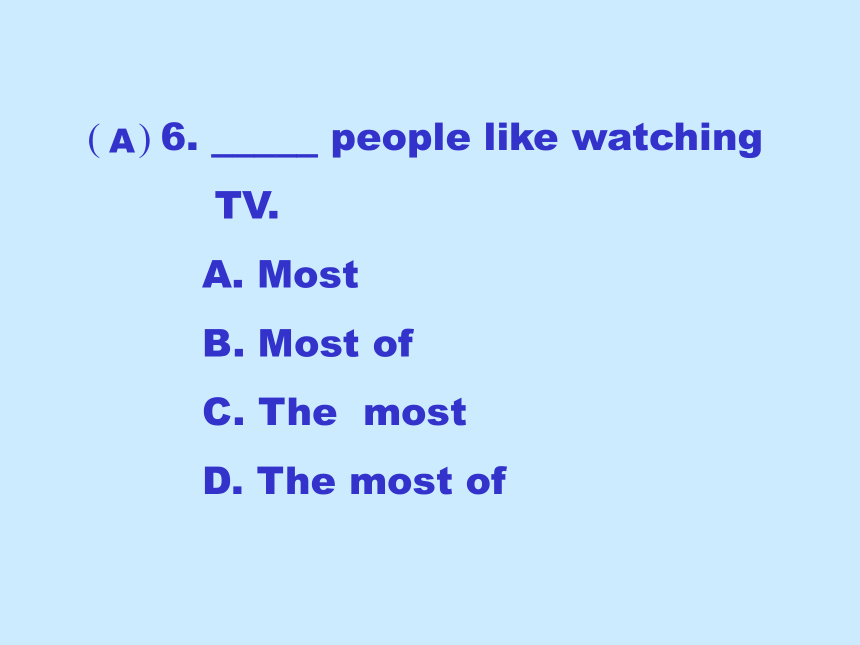
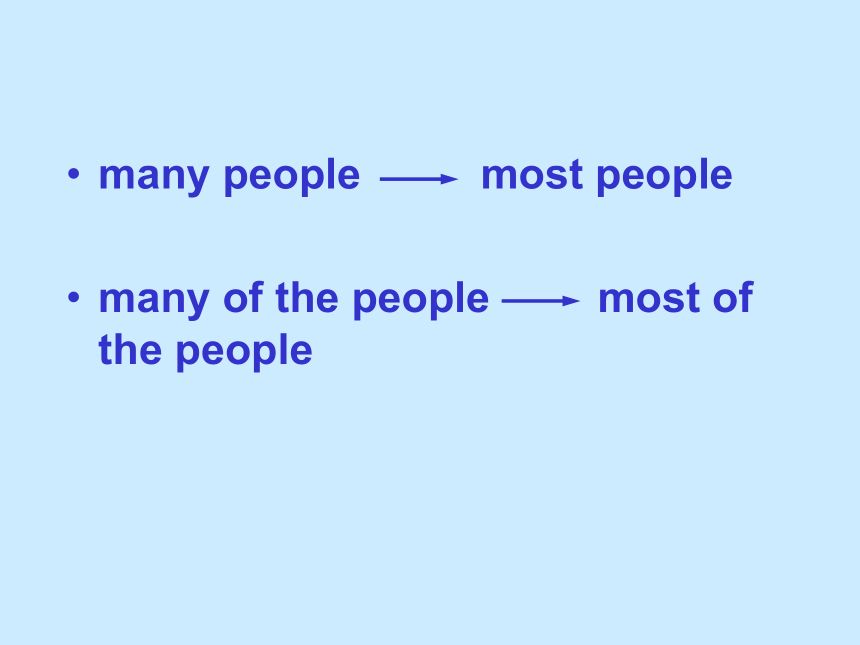
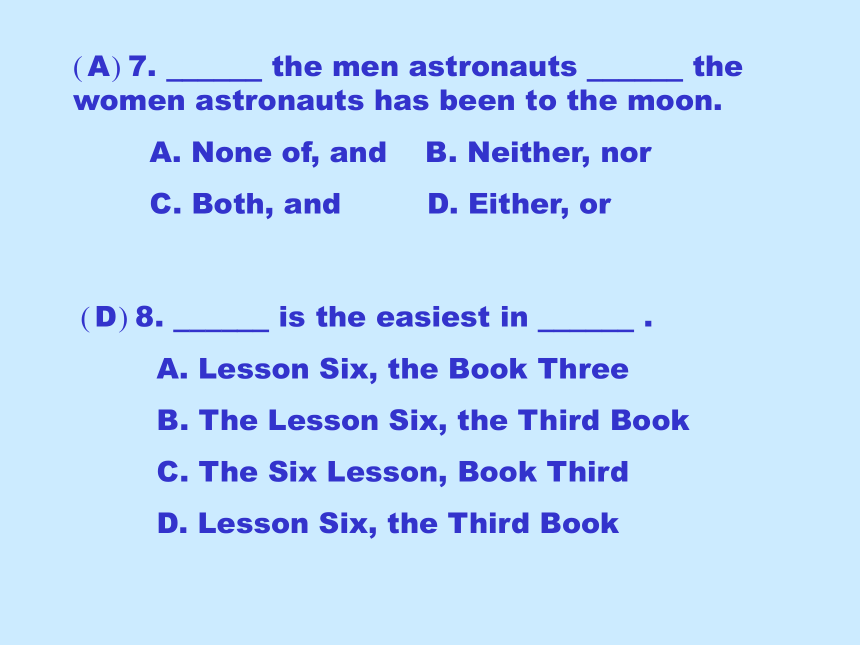
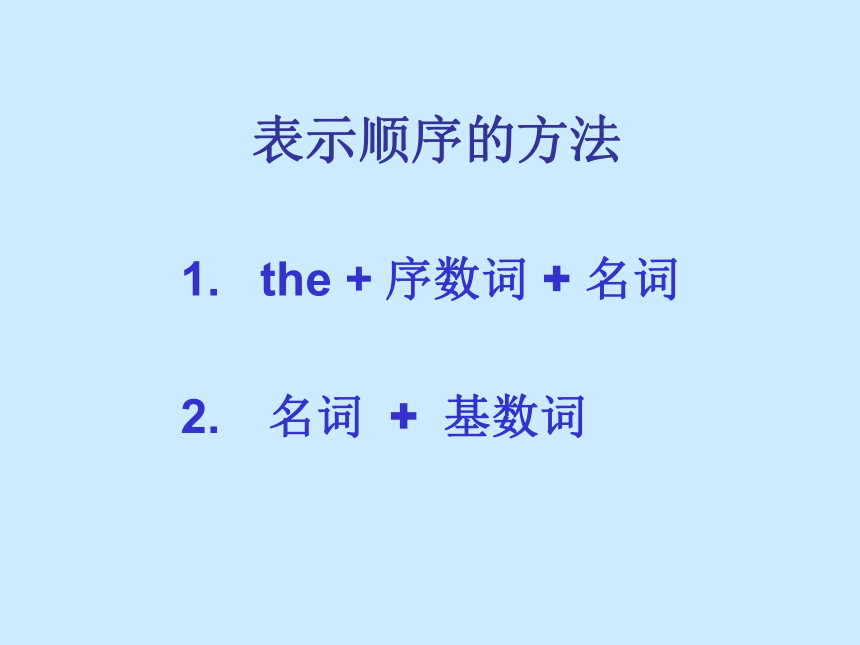
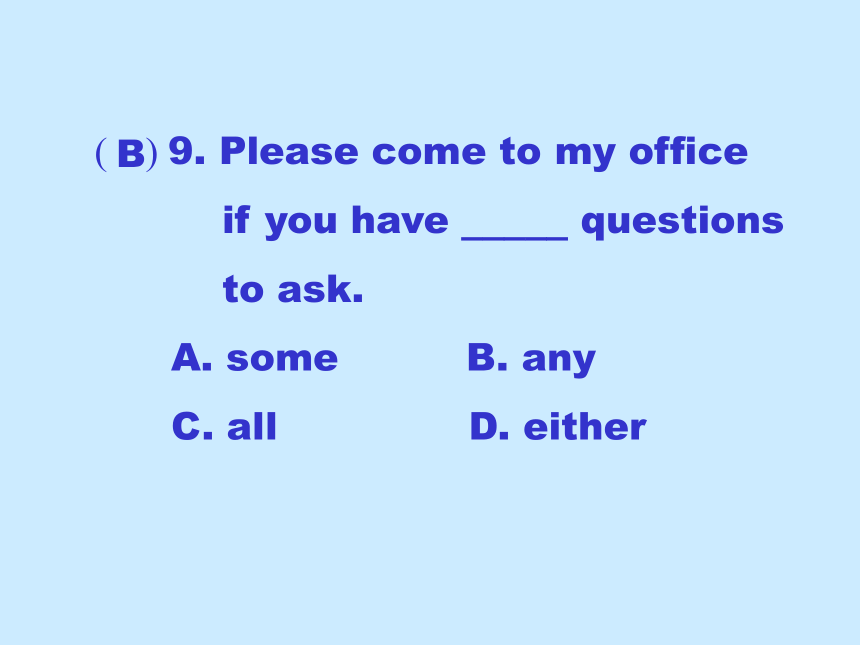
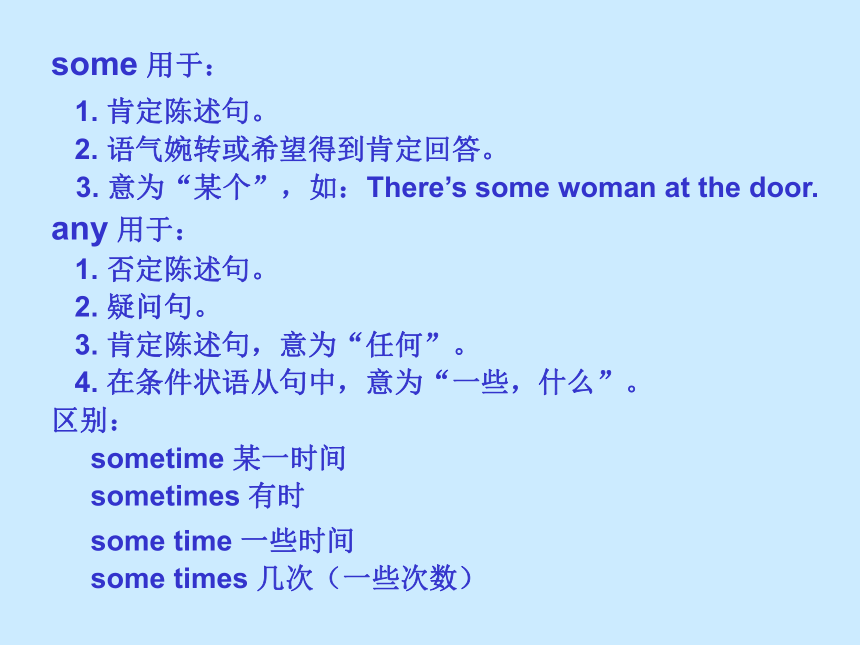
文档简介
一、选择填空
考查重点:词汇、语法、习惯用法等。
解题方法:
1. 直接法
2. 排除法
例:( )Can you tell me ______ the Shanghai Railway Station?
A: how can I get to
B: which is the way to
C: where is
D: how can I arrive in
B
练习题:
( )1. It’s _____ to travel round the
world.
A. a great fun B. great funny
C. great fun D. greatly fun
( )2. Please tell me how much _____
is free.
A. bag B. parcel
C. luggage D. thing
C
C
( ) 3. I saw only Miss Li in the office.
_____ teachers are having a
meeting in the hall.
A. The other B. Others
C. Other D. The others
( ) 4. Peter, show me your _____ hand.
What’s in it ?
A. the other B. other
C. another D. others
A
B
三个区别
1. 两个“另一个”:
the other (两者中) , another (泛指)。
2. 加S和不加S:
加S相当于名词;不加S,相当于形容词。
3. 加the 和不加the:
加the , 表示指定;不加the,表示泛指。
( ) 5. There are many trees
on ______ side of the
playground.
A. either B. both
C. all D. any
D
两者
三者
都
both
all
都不
neither
none
任何
either
any
在…之间
between
among
( ) 6. _____ people like watching
TV.
A. Most
B. Most of
C. The most
D. The most of
A
many people most people
many of the people most of the people
( ) 7. ______ the men astronauts ______ the women astronauts has been to the moon.
A. None of, and B. Neither, nor
C. Both, and D. Either, or
( ) 8. ______ is the easiest in ______ .
A. Lesson Six, the Book Three
B. The Lesson Six, the Third Book
C. The Six Lesson, Book Third
D. Lesson Six, the Third Book
A
D
表示顺序的方法
1. the + 序数词 + 名词
2. 名词 + 基数词
( ) 9. Please come to my office
if you have _____ questions
to ask.
A. some B. any
C. all D. either
B
some 用于:
1. 肯定陈述句。
2. 语气婉转或希望得到肯定回答。
3. 意为“某个”,如:There’s some woman at the door.
any 用于:
1. 否定陈述句。
2. 疑问句。
3. 肯定陈述句,意为“任何”。
4. 在条件状语从句中,意为“一些,什么”。
区别:
sometime 某一时间
sometimes 有时
some time 一些时间
some times 几次(一些次数)
( ) 10. If you spend _____ more
minutes on your English
every day, you will be
better at your English.
A. few B. a few
C. little D. a little
B
形容词、副词的比较级前可以加:
much, a little, a lot, even, still 等,
但不可以加: many, a few。
但是,比较级修饰名词时,
如果是可数名词,比较级前可加a few, many;
如果是不可数名词,比较级前可加a little, much。
如:a little more time, many more books.
( ) 11. We felt _____ after we
heard the _____ news.
A. exciting , excited
B. excited , excited
C. exciting , exciting
D. excited , exciting
D
现在分词作形容词,
常用于物,且含“主动”或
动作还在进行。
过去分词作形容词,
常用于人,且含“被动”或
动作已完成。
( )12. How excited they were
_____ the beautiful sea !
A. seeing B. watching
C. to look D. to see
把原句改为:
They were excited _____ the beautiful sea.
D
( ) 13. The price of this kind of
car is _____ .
A. expensive B. cheap
C. high D.expense
( ) 14. It’s late. My father is still
_____ work.
A. on B. for C. at D. with
C
C
( ) 15. I _____ your help. I can do it
myself.
A. needn’t B. don’t need to
C. need D. don’t need
( ) 16. — ____________?
— He is tall and fat.
A. What’s he
B. What does he like
C. How is he look like
D. What is he like
D
D
( ) 17. It’s raining so hard that the water
in the river can be seen _____ .
A. rise B. raise C rising D. raising
( ) 18. What will you _____ at the meeting
tomorrow ?
A. say B. speak C. talk D. tell
C
A
( ) 19. — Is there anything wrong with
your bike ?
— ______ .
A. Yes, it works well
B. Yes, it doesn’t work
C. No, it doesn’t work
D. No, I’ll have it repaired
( ) 20. He’s allowed to smoke 10 cigarettes
a day, _______ ?
A. has he B. hasn’t C. is he D. isn’t he
B
D
’s + 形 = is + 形
’s + 过去分词:
1. = has + 过去分词(现在完成时)
2. = is + 过去分词(被动语态)
(该过去分词是及物动词,且后面无宾语)
( ) 21. Please tell me ______ .
A. what wrong is with you
B. what wrong with you is
C. what the matter is
D. what your trouble is
D
宾语从句四要点:
1.连词 2.语序 3.时态 4.人称
What’s wrong with you ?
Something is wrong with me.
What’s your trouble ?
My trouble is ……
可以用回答问题的方法来判断陈述句语气
( ) 22. My mother made a card ____ me ____
a birthday present.
A. give , as B. to give , as
C. give , for D. to give , for
动词不定式
1. 加 to 2. 省 to 3. not to
4. what to 5. It’s … to …
He has no pen to write with.
He has no paper to write on.
He has no house to live in.
B
( ) 23. The old lady ______ the house since
she moved in.
A. hasn’t left B. has been away
C. has been left D. had left
短暂动词 延续性动词
⑴begin to study study
⑵ buy have
⑶ die be dead
⑷ join the Party be a Party member
be in the Party
A
( ) 24. _____ of them knew what
the other was doing.
A. Neither B. Any
C. All D. Every
A
( ) 25. She has been in _____ hospital for
a few days. I will go to _____
hospital to see her tomorrow.
A. the , the B. the , a
C. the , / D. / , the
D
有定冠词,表示具体的场所,
没有定冠词,表示抽象的概念。
( ) 26. My uncle spent ______ that
village after he was retired.
A. three years and a half in
B. three and a half years on
C. a half and three years in
D. a half and three years on
A
1.I _____(tell) that there will be a wonderful football match next Sunday.
2.A lot of photos _____ (take) on the Great Wall while I______ (stay) in Beijing.
3.What time_____the class meeting_______
(begin) , do you know?
have been told
were taken
was staying
will
begin
4.There______(be)great changes in Shanghai in the past few years.
5.Don’t worry. You ______(show)your room in a minute.
6.The bus _______(stop) suddenly and the passengers_________(throw)from their seats.
have been
will be shown
stopped
Were thrown
7.I______(meet) a friend of mine
when I ______(walk) in the street last Sunday. I ______ (not see) her for five years.
8.Tom, you______(want) on the phone.
9.Do you know why he_______(not say) a word when he ______(speak) to just now.
met
was walking
hadn’t seen
are wanted
didn’t say
was spoken
10.Children_____(tell) to do some work around their houses. And in many families,
children_____(pay) for_____(do) some housework so that they can learn how
______(make) money for their own use.
11.Last night my son _______(stay) at home. When he ______(ask) why he
_____(not go) to see the film. He said he _______ (be) busy _______(review) his lessons and ________(see) the film later.
are told
are paid
doing
to make
stayed
was asked
hadn’t gone
was
reviewing
would see
三、改写句子
该题型重点考核句子的基本结构,如陈述句,疑问句,感叹句等,也考核简单句和复合句的转换,比较级和最高级的转换,不同句型的转换,以及词语的不同搭配。
1.People call that a chemical change.
________________________________
2.What made you so upset?
________________________________
3.Our teacher often gives us some useful advice.
We___________________________________
Some useful advice______________________
That is called a chemical change.
→ You were made so upset by what?
→ By what were you made so upset?
或:What were you made so upset by?
are often given some useful advice by our teacher.
is often given to us by our teacher.
4.I’m going to send this letter by airmail.
This letter _________________________
5.Does the boy deliver newspapers before he goes to school?
____ newspapers _______by the boy before he goes to school?
6.What do people do to fight pollution?
______ _____ ______to fight pollution?
is going to be sent by airmail.
Are delivered
What is done
7.Mother gave Jack and me some presents on Christmas Day.
Jack and ____ _____ _____ some presents on Christmas Day.
8.The new house cost him a lost of money.
(改为否定句)
The new house _____ cost him _____money.
9.We clean our classroom every day.
( 对划线部分提问)
_____ _____ do you clean your classroom?
I were given
didn’t much
How often
10.It’s about ten minutes’drive from our school to the museum. (对划线部分提问)
_____ ____ is it from your school to the museum?
11.There are little sheep over there,__________?
(改为反意疑问句)
12.Mary sings very well.(改为感叹句)
_________ a good _______ Mary is!
How far
What singer
aren’t there
13.Peter studies the best in his class.
______ ____ in his class studies as _____as Peter.
14.Would you like me to get some bread?
______ ____ get some bread ______ you?
15.Lesson one is not so difficult as Lesson Two.
Lesson one is ____ difficult ____ Lesson Two.
16.Jane isn’t good at running,and May isn’t,either.
______ of the two girls _____ good at running.
Nobody else well
Shall I for
less than
Neither is
17.“Would you please wait for me, Jack?” said Bob.
Jack ______ _______ to wait for Bob.
18.Not all the answers are right.
_____ ____ the answers are right.
19.The mistakes he made in his homework were not so many as yours.
He make _____ mistakes in his homework ____ you.
→Bob asked Jack to wait for him.
→Jack was asked to wait for Bob.
Some of
fewer than
was asked
可把原句改为间接引语:
too…to enough to
20.The room isn’t big enough for us to have a meeting in.
The room is _____ ______ for us to have a meeting in.
1. 把原句改为否定句。
2. 把形容词、副词改为反义词。
too small
21.There is very little snow in Shanghai in winter.
It ______ ______ in Shanghai in winter.
22.My father has given up smoking now.
My father _____ _____ smoke.
23.Be quick, and you’ll catch the bus.
If you don’t ______ , you’ll ______ the bus.
hardly snows
used to
hurry miss
24.I spent twenty yuan on the book.
_____ _____ me twenty yuan to buy the book.
25.The physics problem is so easy that we can
work it out easily.
The physics problem is _____ easy _____ us
to work out.
It cost
very for
https://www.21cnjy.com/help/help_extract.php
考查重点:词汇、语法、习惯用法等。
解题方法:
1. 直接法
2. 排除法
例:( )Can you tell me ______ the Shanghai Railway Station?
A: how can I get to
B: which is the way to
C: where is
D: how can I arrive in
B
练习题:
( )1. It’s _____ to travel round the
world.
A. a great fun B. great funny
C. great fun D. greatly fun
( )2. Please tell me how much _____
is free.
A. bag B. parcel
C. luggage D. thing
C
C
( ) 3. I saw only Miss Li in the office.
_____ teachers are having a
meeting in the hall.
A. The other B. Others
C. Other D. The others
( ) 4. Peter, show me your _____ hand.
What’s in it ?
A. the other B. other
C. another D. others
A
B
三个区别
1. 两个“另一个”:
the other (两者中) , another (泛指)。
2. 加S和不加S:
加S相当于名词;不加S,相当于形容词。
3. 加the 和不加the:
加the , 表示指定;不加the,表示泛指。
( ) 5. There are many trees
on ______ side of the
playground.
A. either B. both
C. all D. any
D
两者
三者
都
both
all
都不
neither
none
任何
either
any
在…之间
between
among
( ) 6. _____ people like watching
TV.
A. Most
B. Most of
C. The most
D. The most of
A
many people most people
many of the people most of the people
( ) 7. ______ the men astronauts ______ the women astronauts has been to the moon.
A. None of, and B. Neither, nor
C. Both, and D. Either, or
( ) 8. ______ is the easiest in ______ .
A. Lesson Six, the Book Three
B. The Lesson Six, the Third Book
C. The Six Lesson, Book Third
D. Lesson Six, the Third Book
A
D
表示顺序的方法
1. the + 序数词 + 名词
2. 名词 + 基数词
( ) 9. Please come to my office
if you have _____ questions
to ask.
A. some B. any
C. all D. either
B
some 用于:
1. 肯定陈述句。
2. 语气婉转或希望得到肯定回答。
3. 意为“某个”,如:There’s some woman at the door.
any 用于:
1. 否定陈述句。
2. 疑问句。
3. 肯定陈述句,意为“任何”。
4. 在条件状语从句中,意为“一些,什么”。
区别:
sometime 某一时间
sometimes 有时
some time 一些时间
some times 几次(一些次数)
( ) 10. If you spend _____ more
minutes on your English
every day, you will be
better at your English.
A. few B. a few
C. little D. a little
B
形容词、副词的比较级前可以加:
much, a little, a lot, even, still 等,
但不可以加: many, a few。
但是,比较级修饰名词时,
如果是可数名词,比较级前可加a few, many;
如果是不可数名词,比较级前可加a little, much。
如:a little more time, many more books.
( ) 11. We felt _____ after we
heard the _____ news.
A. exciting , excited
B. excited , excited
C. exciting , exciting
D. excited , exciting
D
现在分词作形容词,
常用于物,且含“主动”或
动作还在进行。
过去分词作形容词,
常用于人,且含“被动”或
动作已完成。
( )12. How excited they were
_____ the beautiful sea !
A. seeing B. watching
C. to look D. to see
把原句改为:
They were excited _____ the beautiful sea.
D
( ) 13. The price of this kind of
car is _____ .
A. expensive B. cheap
C. high D.expense
( ) 14. It’s late. My father is still
_____ work.
A. on B. for C. at D. with
C
C
( ) 15. I _____ your help. I can do it
myself.
A. needn’t B. don’t need to
C. need D. don’t need
( ) 16. — ____________?
— He is tall and fat.
A. What’s he
B. What does he like
C. How is he look like
D. What is he like
D
D
( ) 17. It’s raining so hard that the water
in the river can be seen _____ .
A. rise B. raise C rising D. raising
( ) 18. What will you _____ at the meeting
tomorrow ?
A. say B. speak C. talk D. tell
C
A
( ) 19. — Is there anything wrong with
your bike ?
— ______ .
A. Yes, it works well
B. Yes, it doesn’t work
C. No, it doesn’t work
D. No, I’ll have it repaired
( ) 20. He’s allowed to smoke 10 cigarettes
a day, _______ ?
A. has he B. hasn’t C. is he D. isn’t he
B
D
’s + 形 = is + 形
’s + 过去分词:
1. = has + 过去分词(现在完成时)
2. = is + 过去分词(被动语态)
(该过去分词是及物动词,且后面无宾语)
( ) 21. Please tell me ______ .
A. what wrong is with you
B. what wrong with you is
C. what the matter is
D. what your trouble is
D
宾语从句四要点:
1.连词 2.语序 3.时态 4.人称
What’s wrong with you ?
Something is wrong with me.
What’s your trouble ?
My trouble is ……
可以用回答问题的方法来判断陈述句语气
( ) 22. My mother made a card ____ me ____
a birthday present.
A. give , as B. to give , as
C. give , for D. to give , for
动词不定式
1. 加 to 2. 省 to 3. not to
4. what to 5. It’s … to …
He has no pen to write with.
He has no paper to write on.
He has no house to live in.
B
( ) 23. The old lady ______ the house since
she moved in.
A. hasn’t left B. has been away
C. has been left D. had left
短暂动词 延续性动词
⑴begin to study study
⑵ buy have
⑶ die be dead
⑷ join the Party be a Party member
be in the Party
A
( ) 24. _____ of them knew what
the other was doing.
A. Neither B. Any
C. All D. Every
A
( ) 25. She has been in _____ hospital for
a few days. I will go to _____
hospital to see her tomorrow.
A. the , the B. the , a
C. the , / D. / , the
D
有定冠词,表示具体的场所,
没有定冠词,表示抽象的概念。
( ) 26. My uncle spent ______ that
village after he was retired.
A. three years and a half in
B. three and a half years on
C. a half and three years in
D. a half and three years on
A
1.I _____(tell) that there will be a wonderful football match next Sunday.
2.A lot of photos _____ (take) on the Great Wall while I______ (stay) in Beijing.
3.What time_____the class meeting_______
(begin) , do you know?
have been told
were taken
was staying
will
begin
4.There______(be)great changes in Shanghai in the past few years.
5.Don’t worry. You ______(show)your room in a minute.
6.The bus _______(stop) suddenly and the passengers_________(throw)from their seats.
have been
will be shown
stopped
Were thrown
7.I______(meet) a friend of mine
when I ______(walk) in the street last Sunday. I ______ (not see) her for five years.
8.Tom, you______(want) on the phone.
9.Do you know why he_______(not say) a word when he ______(speak) to just now.
met
was walking
hadn’t seen
are wanted
didn’t say
was spoken
10.Children_____(tell) to do some work around their houses. And in many families,
children_____(pay) for_____(do) some housework so that they can learn how
______(make) money for their own use.
11.Last night my son _______(stay) at home. When he ______(ask) why he
_____(not go) to see the film. He said he _______ (be) busy _______(review) his lessons and ________(see) the film later.
are told
are paid
doing
to make
stayed
was asked
hadn’t gone
was
reviewing
would see
三、改写句子
该题型重点考核句子的基本结构,如陈述句,疑问句,感叹句等,也考核简单句和复合句的转换,比较级和最高级的转换,不同句型的转换,以及词语的不同搭配。
1.People call that a chemical change.
________________________________
2.What made you so upset?
________________________________
3.Our teacher often gives us some useful advice.
We___________________________________
Some useful advice______________________
That is called a chemical change.
→ You were made so upset by what?
→ By what were you made so upset?
或:What were you made so upset by?
are often given some useful advice by our teacher.
is often given to us by our teacher.
4.I’m going to send this letter by airmail.
This letter _________________________
5.Does the boy deliver newspapers before he goes to school?
____ newspapers _______by the boy before he goes to school?
6.What do people do to fight pollution?
______ _____ ______to fight pollution?
is going to be sent by airmail.
Are delivered
What is done
7.Mother gave Jack and me some presents on Christmas Day.
Jack and ____ _____ _____ some presents on Christmas Day.
8.The new house cost him a lost of money.
(改为否定句)
The new house _____ cost him _____money.
9.We clean our classroom every day.
( 对划线部分提问)
_____ _____ do you clean your classroom?
I were given
didn’t much
How often
10.It’s about ten minutes’drive from our school to the museum. (对划线部分提问)
_____ ____ is it from your school to the museum?
11.There are little sheep over there,__________?
(改为反意疑问句)
12.Mary sings very well.(改为感叹句)
_________ a good _______ Mary is!
How far
What singer
aren’t there
13.Peter studies the best in his class.
______ ____ in his class studies as _____as Peter.
14.Would you like me to get some bread?
______ ____ get some bread ______ you?
15.Lesson one is not so difficult as Lesson Two.
Lesson one is ____ difficult ____ Lesson Two.
16.Jane isn’t good at running,and May isn’t,either.
______ of the two girls _____ good at running.
Nobody else well
Shall I for
less than
Neither is
17.“Would you please wait for me, Jack?” said Bob.
Jack ______ _______ to wait for Bob.
18.Not all the answers are right.
_____ ____ the answers are right.
19.The mistakes he made in his homework were not so many as yours.
He make _____ mistakes in his homework ____ you.
→Bob asked Jack to wait for him.
→Jack was asked to wait for Bob.
Some of
fewer than
was asked
可把原句改为间接引语:
too…to enough to
20.The room isn’t big enough for us to have a meeting in.
The room is _____ ______ for us to have a meeting in.
1. 把原句改为否定句。
2. 把形容词、副词改为反义词。
too small
21.There is very little snow in Shanghai in winter.
It ______ ______ in Shanghai in winter.
22.My father has given up smoking now.
My father _____ _____ smoke.
23.Be quick, and you’ll catch the bus.
If you don’t ______ , you’ll ______ the bus.
hardly snows
used to
hurry miss
24.I spent twenty yuan on the book.
_____ _____ me twenty yuan to buy the book.
25.The physics problem is so easy that we can
work it out easily.
The physics problem is _____ easy _____ us
to work out.
It cost
very for
https://www.21cnjy.com/help/help_extract.php
同课章节目录
